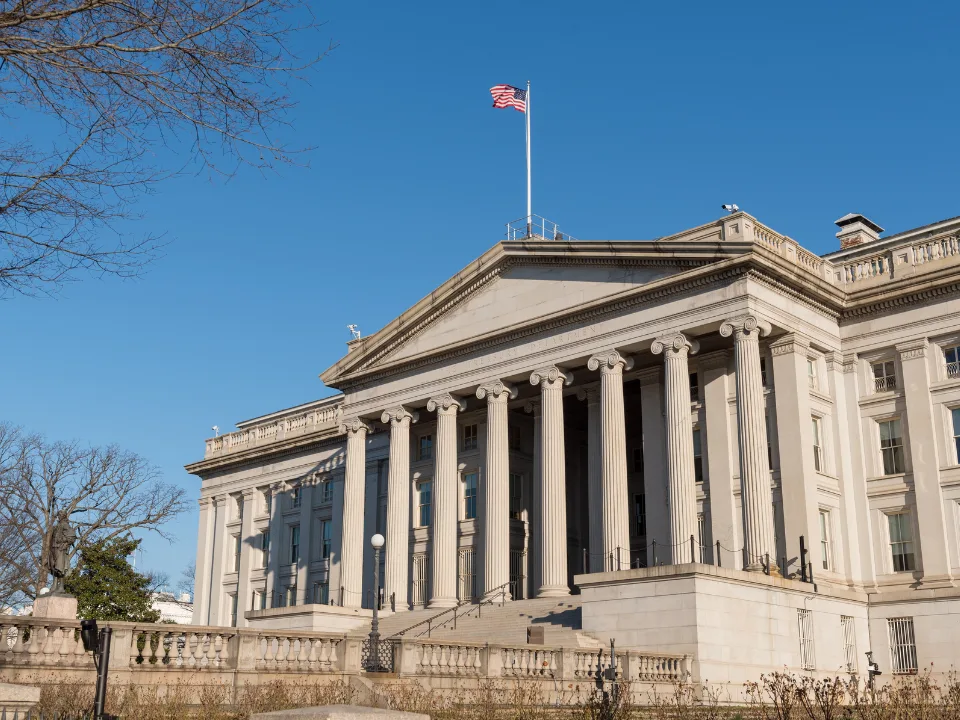The Farm Belt is Booming
As commodity prices have risen, farmers, ranchers, and agricultural companies have experienced significant profits, making them some of the few industries to thrive amid a slowing economy in the United States.
Good morning. High prices for crops and livestock are fueling a boom in the U.S. Farm Belt. Former partners Stephen Ross and Jorge Perez are competing to develop a coveted tract of land on the Miami waterfront.
Single-family housing starts are dropping it low, and likely to get lower as mortgage rates hit record highs. And unneeded office space could create an economic downturn much larger than the Great Recession. Let’s dive in!
⚡ Want to share the CRE Daily? Invite your friends to sign up here.
Quick shoutout to today’s sponsor, FarmTogether. If you are looking to diversify and add some institutional-quality farmland to your portfolio, they’ve got you covered.
THIS LAND IS MY LAND
Farmland Escapes Real Estate Slump as Prices Soar to Record

High prices for crops and livestock have led to a boom in the Farm Belt. And because farmers, ranchers, and agricultural companies are raking in the dough, we can expect a surge in farmland heading into 2023.
Staying strong: Q3 farmland prices in the Midwest were up 20% YoY, according to data from the Federal Reserve Bank of Chicago and the National Association of Realtors. This marks the eleventh consecutive quarter of gains, the longest streak since 2014.
Bountiful harvest: Higher prices for crops and livestock, including corn, wheat, and sunflower oil, have contributed to farm profits reaching almost $161B this year. That’s 14% higher than in 2021, according to the US Department of Agriculture.
Family farms rejoice: If predictions are accurate, farm income will reach its highest level in inflation-adjusted dollars since 1973. This significant recovery follows an agricultural recession that negatively impacted farmers and their suppliers in recent years.
Healthier than ever: Increased demand for farmland coincides with pandemic-induced shifts in population, with more people moving to non-metropolitan areas. Farmland has also become more attractive as a source of income due to the shift to clean energy, including renewable diesel and green energy sources like solar panels and wind turbines.
➥ THE TAKEAWAY
Bet the farm: If you’re looking to invest in something tangible, like a piece of dirt, instead of some obscure digital currency (shoutout FTX), then farmland might be the way to go. Not only is investor interest on the rise, but with population growth and climate change affecting food production, productive land in the Midwest is becoming increasingly scarce.
SPONSORED
Add US Farmland To Your Portfolio, A Superior Asset Class
The ultra-wealthy like Bill Gates and Thomas Peterffy are investing in U.S. farmland… and now you can too. With FarmTogether, accredited investors can add institutional quality farmland to their portfolios with as little as $15k. Even more, farmland is a historically stable, inflation-hedging, safe-haven asset.
Stabilize your portfolio and preserve your capital with this uncorrelated real asset.
RELATED NO MORE
Former Partners Compete For Premium Parcel in Downtown Miami
NYC developer Stephen Ross and Miami developer Jorge Perez, former partners, are now competing for a 15.5-acre tract of beachfront land in downtown Miami. Gentling Malaysia, Bhd., the parcel’s owner, wants $1B for the land. While neither Ross nor Perez has made a formal offer, both parties have expressed interest.
We go way back: Ross and Perez met 40 years ago at the University of Michigan and have remained friends ever since. Via either a legal contract or a gentlemen’s agreement, Ross agreed to keep his hands off Miami as long as Perez stayed out of NYC. But after what both men call an “amicable separation,” that’s over now.
Wasting no time: Since the agreement ended, Ross—a native Floridian who owns the Miami Dolphins—has already moved ahead with a few previously forbidden projects, including the construction of what will be Miami’s tallest commercial office building. Meanwhile, Perez hasn’t made moves in New York, but that’s because he thinks all the deals are in Florida right now.
➥ THE TAKEAWAY
There’s you, there’s me, and there’s us: Perez and Ross have said they’re open to doing deals together in the future, and have even discussed embarking on a joint venture for this specific parcel. But the two haven’t reached an agreement yet. At this point, Mr. Ross seems more likely to tackle the project, given his familiarity with Miami and his aggressive activity in the area.
SINKING CONFIDENCE
Record Mortgage Rates Stifle Single-Family Housing Market
After the 30-year-mortgage rate hit its highest mark in 20 years, the residential market heads for its seventh consecutive down quarter—the longest cold streak since the Great Recession. No market has been hit harder than single-family homebuilding, which dropped to a 2.5-year low last month and isn’t likely to recover very soon.
Singles (not) in your area: Single-family housing starts—the lion’s share of homebuilding—fell 4.1% in November to a seasonally adjusted rate of 828K units. Those are the worst numbers since the pandemic first struck a serious blow back in May 2020.
Building permits plunge: Construction permits and homebuilder confidence have both declined significantly as well. Permits for housing projects with five or more units fell 17.9% to a rate of 509,000 units, the lowest level since May 2021. Single-family building permits decreased by 7.1% to a rate of 781,000 units, the lowest level since May 2020.

Bloomberg
➥ THE TAKEAWAY
The more the merrier: Multi-family complexes are doing just fine, with starts jumping 4.8% to hit their highest level since April. The success of multi-family starts has basically offset the single-family failure, with overall construction exceeding most estimates. That’s because the two development types are linked. When single-family starts go down, high home costs prop up multi-family starts by forcing people to keep renting. However, this might not be enough to revise the housing market in the short term. The Fed has salted the wound by teasing that still more rate hikes are to come before the end of 2023. Fasten your seat belts,.
THE BIGGER SHORT
Distressed Asset Specialists Predict Huge CRE Crash
According to distressed asset specialists, investors who swoop in to purchase struggling assets for a fraction of what they usually cost, CRE’s reckoning is nigh. In the next few years, $500B worth of commercial mortgage loans will come due for repayment, and borrowers unable to pay back or refinance these loans could trigger a collapse even bigger than 2008.
Who needs ‘em? The Great Recession was caused by irresponsible lending practices for single-family homes. This crisis would come from similarly irresponsible behavior for office properties, which makes the problem both bigger because more money is involved. And while some vacant offices could be converted to residential units, not all of them can, which means that a whole lot of money is about to disappear.
Virtuous vultures: A borrower’s pain is a distressed asset specialist’s pleasure. These investors know how bad things are getting because an uptick in CRE bankruptcy declarations translates directly into a jump in demand for their specialist services. And demand did jump in the second half of 2021. In fact, it’s still rising daily as borrowers sweat and lenders crack down.
➥ THE TAKEAWAY
Feeding time: Distressed asset specialists predict that business will boom well into 2023, so the streak of CRE-related bankruptcies should continue. Some even believe losses will be so bad that the consequent damage will create “permanent resets” in the way both the CRE and financial sectors operate. But don’t worry, distressed asset specialists will probably still be hiring.
📰 Editors’ Picks
-
More for your dollar: Recent inflation has created a surge in retail dollar stores as consumers continue searching for cheaper options ahead of the recession.
-
Less than Six Flags: An activist shareholder in Six Flags (SIX) has urged the theme park brand to sell or spin off some of its real estate to compensate for declining share value.
-
Thor hammers Lightstone: Thor Equity sued three executives of Lightstone Group for $80M, citing a breach of fiduciary duties.
-
Making gains: The CMBS special servicing rate rose 5.20% last month, marking its biggest jump since September 2020.
-
Half measures: A Boston-based developer has put his Texas hotel on the market for other developers, because it’s only half-finished.
-
A BREIT idea? In light of BREIT’s recent withdrawal limits, investors wonder whether BREIT is as valuable as the market thinks, given that it might not be as liquid as Blackstone says.
-
A clean slate: Since pivoting in 2020, multifamily developer Slate Property Group has spent $320M acquiring and developing 10 homeless shelters in New York City.
-
WeBroke: Once flush with cash, WeWork (WE) is running out of money again and, at this rate, heading for default.
🤝 Deals & Dealmakers
-
Silver Spring runs gold: Enterprise Community Development has acquired Parkside Terrace, a multifamily complex in Silver Spring, MD, for $20M.
-
Pricey vacation: ABS National Business Parks just acquired their second office in Palm Beach Gardens for $38M.
-
Setting sail: MCB Real Estate has received approval to buy Harborplace in Baltimore, freeing the property from its three-year receivership.
-
Big Data’s big break: The mayor of Round Rock, TX has approved tax rebates of up to 50% for data centers going up in his town.
-
Lingerfelt is sure feeling it: Lingerfelt sold its 11-property portfolio to Seminole Trail Management for $119M.
-
Buying the Bronx: The Gilbane Development Company has expanded its affordable housing holdings with the $107M purchase of 477 units in the Bronx.
-
Domain’s new king: In a joint venture, MG Properties and Rockwood Capital acquired Domain San Diego for $184.6M from Magnolia Capital.
-
Signs of life: Alexandria Real Estate Equities’ $201M plan for a life sciences complex in Houston shows that even more is in store for the Lone Star State.
📈 Chart of the Day

😎 Offering-MEME-Orandum

@securethepromote
You share. We listen. As always, send us feedback at [email protected].
What did you think of today’s newsletter? |
DISCLAIMER: None of this is financial advice. This newsletter is strictly educational and is not investment advice or a solicitation to buy or sell any assets or to make any financial decisions. Please be careful and do your own research.



















